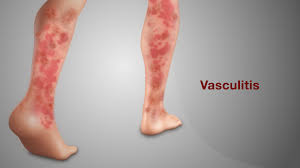Vasculitis
Vasculitis
- Vasculitis is a rare autoimmune disorder in which the immune system causes inflammation of blood vessels.
- Inflammation can lead to thickening, narrowing, or weakening of the vessels.
- Reduced blood flow from affected vessels can damage organs and tissues.
- Early diagnosis and treatment are critical to prevent serious complications.
- Vasculitis can affect any size of blood vessel – small, medium, or large.
- It can involve various organs depending on the type of vasculitis.
What are signs and symptoms of Vasculitis?
- General symptoms: Fever, fatigue, weight loss, and malaise.
- Skin symptoms: Rashes, purpura (purple spots), ulcers, or bruising.
- Muscle and joint symptoms: Pain, swelling, or weakness.
- Neurological symptoms: Numbness, tingling, or weakness if nerves are affected.
- Organ-specific symptoms:
- Kidneys: Blood in urine, reduced kidney function
- Lungs: Shortness of breath, coughing, or chest pain
- Heart: Chest pain, palpitations
- Eyes: Vision changes, redness, or pain
Symptoms vary depending on the size of blood vessels and organs involved.
What are common causes of Vasculitis?
- Autoimmune dysfunction: The immune system mistakenly attacks blood vessel walls.
- Genetic predisposition: Family history of autoimmune diseases can increase risk.
- Infections: Certain viral or bacterial infections may trigger vasculitis in susceptible individuals.
- Medications: Some drugs can provoke immune-mediated inflammation of blood vessels.
- Other autoimmune diseases: Conditions like rheumatoid arthritis, lupus, or Sjögren’s syndrome can increase the likelihood of vasculitis.
- Environmental triggers: Rarely, exposure to chemicals or toxins may contribute to onset.
Fast Facts on Vasculitis?
- What is it: Rare autoimmune disorder causing blood vessel inflammation.
- Affected vessels: Small, medium, or large vessels throughout the body.
- Common symptoms: Fever, fatigue, rashes, joint/muscle pain, numbness, organ-specific issues.
- Causes: Autoimmune dysfunction, genetics, infections, medications, other autoimmune diseases.
- Complications if untreated: Organ damage, aneurysm, stroke, kidney or heart failure.
- Treatment: Corticosteroids, immunosuppressants, biologics, lifestyle care, and regular monitoring.
- Key point: Early diagnosis and treatment prevent severe organ damage and improve quality of life.
How Vasculitis is Diagnosed ?
- Medical history & physical examination – Doctors check for general symptoms (fever, fatigue), skin changes (rashes, bruising), joint or muscle pain, and organ-specific signs.
- Blood tests – Identify inflammation markers (ESR, CRP) and autoantibodies (e.g., ANCA) to detect autoimmune activity.
- Imaging tests – Ultrasound, CT, MRI, or PET scans to visualize affected blood vessels.
- Biopsy – A small tissue sample may be taken from skin, kidney, or other affected organs to confirm vessel inflammation.
- Organ function tests – Kidney, heart, lung, or neurological tests assess the extent of organ involvement.
How Vasculitis is Treated ?
- Corticosteroids – Reduce inflammation quickly and control acute symptoms.
- Immunosuppressants – Medications like methotrexate, azathioprine, or cyclophosphamide help regulate the immune system and prevent further vessel damage.
- Biologic therapies – Target specific immune pathways in severe or refractory cases.
- Lifestyle care – Balanced diet, avoiding infections, regular exercise, and stress management to support overall health.
- Regular monitoring – Ongoing follow-ups to assess organ function, detect flares early, and adjust treatment as needed.
What happens if left untreated ?
If vasculitis is left untreated, the ongoing inflammation of blood vessels can lead to serious and potentially life-threatening complications. Reduced blood flow may damage vital organs such as the kidneys, heart, lungs, and brain, resulting in kidney failure, heart attack, stroke, or aneurysms. Chronic inflammation can also cause persistent fatigue, muscle and joint pain, skin ulcers, and neurological problems. Early diagnosis and proper treatment are essential to control inflammation, protect organs, and prevent permanent damage or disability.
How OARC Can Help?
At OARC, we offer holistic care to patients suffering from all kind of arthritis and autoimmune diseases by our renowned rheumatologist. Because of chronic illness of the disease, we spend some time with the patient helping them to know about their disease, and demystify the myths regarding the disease and treatment. We have collaboration with NABL accredited laboAStory where all kind of blood tests can be done at reasonable costs. We also have patient support system where patient can approach in case of any emergency. We believe in a friendly relation with patients so that they can share all their sufferings and get the best possible treatment.



